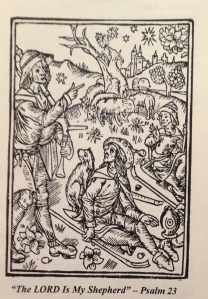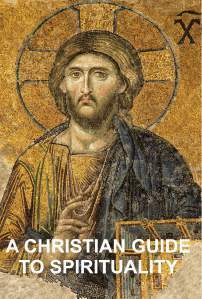Stephen W. Hiemstra's Blog, page 271
January 16, 2015
¿Cómo Nutrimos Nuestro Camino con el Señor?
 Entonces, ustedes como escogidos de Dios, santos y amados, revístan se de tierna compasión, bondad, humildad, mansedumbre y paciencia (tolerancia); soportándose unos a otros y perdonándose unos a otros, si alguien tiene queja contra otro. Como Cristo los perdonó, así también háganlo ustedes. (Col 3:12-13 NBH)
Entonces, ustedes como escogidos de Dios, santos y amados, revístan se de tierna compasión, bondad, humildad, mansedumbre y paciencia (tolerancia); soportándose unos a otros y perdonándose unos a otros, si alguien tiene queja contra otro. Como Cristo los perdonó, así también háganlo ustedes. (Col 3:12-13 NBH)
Por Stephen W. Hiemstra
Debemos nutrir nuestro camino con el Señor, pero el control no está en nuestras manos. “El discipulado significa adhesión a Cristo” [1] (Bonhoeffer 1995, 59).
Jesús cuenta la historia de un hombre con dos hijos. El hijo mas joven se le acercó un día y pidió por su herencia en dinero en efectivo. A continuación, tomó el dinero, salió el pueblo, y comenzó a vivo en estilo. Este modo de la vida imprudente no duró mucho tiempo y pronto el joven tuvo que conseguir un trabajo. No estar un planificador, él tiene que aceptar trabajo degradante. Como la mente del hijo empezó a vagar, él acordó la vida buena a hogar y resolvió a pedir su padre a aceptar lo otra vez como un sirviente doméstico. Cuando el padre vi que su hijo que venía, él fue fuera a encontrarlo y envuelto su brazos alrededor de él. Como él hijo comienzo a disculparse por su comportamiento horrible, su padre no escuchó nada de ella. Él llevó a su hijo; él le limpió ; y le consiguió algo ropas nuevas [2]; y dio una fiesta. Más tarde, cuando su hermano más altero venia a casa y descubrió el partido, se convirtió en celoso, y comenzó a actuar malo. Pero su padre le recordó: “Pero era necesario hacer fiesta y regocijarnos, porque éste, tu hermano, estaba muerto y ha vuelto a la vida; estaba perdido y ha sido hallado.” (Luke 15:32 NBH)
El historia del Hijo Pródigo muestra un hombre joven que experiencia unas series de retos—transiciones—que lo empodera a ver su padre con ojos nuevos y a aceptar la ayuda de su padre [3]. Sino estos desafíos, él no habría sido capaz de cerrar la brecha entre él y su padre.
Para nosotros, los visitas del hospital suelen plantear tales transiciones. Los visitas del hospital comienzan normalmente con una problema de salud; seguía a un confuso periodo de tratamientos médicos; y ende con un retorno a la vida exterior. El giro es que la problema de salud si mismo es a menudo un síntoma, no la causa real de la visita. La problema real podría ser el dolor sobre la muerto de un miembro de la familia, la trauma no resuelto del pasado, o un estilo de la vida mala. Debido a que un solución de la problema real permanece nublada por la negación, muchas gente mueren innecesariamente de enfermedades prevenibles y dolencias tratables.
Nubes también cubren nuestro camino de fe. Todos de nosotros niegan la necesidad para la gracia de Dios y tener tropiezo desagradable bloques—especialmente orgullo, otros pecados, y nuestra propia mortalidad—que debe ser removida por razón de salvar nos de nuestros mismos. Sólo a través de aceptar la gracia de Dios que podemos tomar los pasos necesario de obediencia.
La historia del Hijo Prodigo asegura nos que nuestro Padre Celestial es ansioso de perdonar, ansioso de nosotros a tomar pasos de obediencia, y ansioso por cerrar la brecha que no podemos puente para nosotros mismo.
[1] [“Discipleship means adherence to Christ”]
[2] Como Cristianos, compartimos la mayoría sólo una cosa en común: somos perdonado. Esto es nuestro padre celestial quien nos vestimos con: “compasión, bondad, humildad, mansedumbre y paciencia” (Col 3:12 NBH). Pero las ropas son un regalo; no las ganamos!
[3] Turansky y Miller (2013, 4) observe: “Aun en los tiempos del Antiguo Testamento, Dios supo que los hijos aprender mayor a través de las experiencias en la vida” [“Even in Old Testament times, God knew that kids learn best through life experiences.”]
REFERENCIAS
Bonhoeffer, Dietrich. 1995. The Cost of Discipleship (Orig. pub. 1937). New York: Simon and Schuster.
Turansky, Scott and Joanne Miller. 2013. The Christian Parenting Handbook: 50 Heart-Based Strategies for All the Stages of Your Child’s Life. Nashville: Thomas Nelson.

January 14, 2015
Bolme Guides Authors in Christian Marketing
 Sarah Bolme. 2014. Your Guide to Marketing Books in the Christian Marketplace. Charlotte: Crest Publications.
Sarah Bolme. 2014. Your Guide to Marketing Books in the Christian Marketplace. Charlotte: Crest Publications.
Review by Stephen W. Hiemstra
One surprise when you become an author is how hard it is to sell books. This comes as a surprise because most authors are also avid readers. If you are an avid reader, snapping up books recommended by friends and colleagues all the time, it comes as a surprise to learn that everyone does not behave that way! Sarah Bolme book, Your Guide to Marketing Books in the Christian Marketplace, works hard to make sure that disappointment not follow surprise for aspiring authors and publishers.
An important theme in Bolme’s book is the depth and complexity of the Christian book market. Christian books are bought and sold both formally and informally in marketing channels that differ by denomination, ethnicity, workplace, and region. It is not enough to publish your book on Amazon.com and cash your royalty checks. At a minimum, Christian readers want to know that your theology is consistent with their own faith statements and that the people with whom they study, worship, volunteer, and work with find your book compelling enough to read and discuss. The vetting process is important and it shapes book marketing and sales. Bolme likes to point out: Marketing and selling books is not a sprint, it is a marathon (4).
Bolme’s book is structured around this conception of the Christian book market. Bolme writes in 19 chapters divided into 4 parts:
Launching Your Books (chapters 1-6);
Selling Your Books (7-15);
Targeting Special Markets (16-19); and
Reference (Index).
These chapters are preceded by a foreword and Introduction, and followed by a number of appendices on special topics.
Reading Bolme’s text has taken me 3 months to read, but not because I have been procrastinating. In September, when I began reading, I issued my first press release. I had wanted to issue a press release in August when I began promoting my book, A Christian Guide to Spirituality (T2Pneuma.com), but it was not until I read Bolme’s discussion (122-123) that I learned how to do it. I found myself requesting reviews (43-53), running book giveaways (www.GoodReads.com;180), doing radio interviews (124-126), applying for awards (63-72), and joining new groups (e.g. Christian Small Publishers Association—www.ChristianPublishers.net; 7-17) as I read the book. These activities distracted me from progressing promptly through the book and finishing a review.
I also learned why some of my early marketing attempts were unsuccessful.
An important problem facing authors and publishers today is the explosion of new book titles and the collapsing readership. People read fewer printed books than they used to because of, in part, competition from other media, but the growth in independent publishing has also increased the number of authors publishing (73-75). This means that retailers are inundated with titles and cannot respond directly to author requests; instead, they work through distributors who filter the available books on their behalf. My requests that local retailers stock my book failed because I did not understand the stocking process.
For Christian writers and publishers, Sarah Bolme’s Your Guide to Marketing Books in the Christian Marketplace is an important read. Although I did not immediately become a marketing success having read this book, I did finally get an appreciation for the task at hand and got pointed in the right direction. You may also find it helpful.
January 12, 2015
What Are the Big Questions of the Faith?

Art by Stephen W. Hiemstra
“For God so loved the world, that he gave his only Son, that whoever believes in him should not perish but have eternal life.” (John 3:16)
By Stephen W. Hiemstra
How does the Christian answer the four big questions of faith? [1] The Apostle’s Creed, the Lord’s Prayer, and the Ten Commandments offer real insights.
Who is God? In the Apostle’s Creed, God is one God in three persons—Father, Son, and Holy Spirit—who we can know through the story of Jesus as revealed in scripture. In the Lord’s Prayer, God, through His sovereign rule over all creation, shapes us in his image day by day as we walk in obedience to Him. In the Ten Commandments, God is the supreme covenant maker who expresses his love for us through concrete guidance. The Triune God is alive and works in the world to form the church, forgive sin, and grant us re-created life.
Who are we? In the Apostle’s Creed, we are invited into relationship with the Triune God and to participate in the story of Jesus. In the Lord’s Prayer, we are seen as created in God’s image which then offers us dignity and intrinsic value. However, our reflection of God’s image is imperfect because of the influence of sin. In the Ten Commandments, God initiates a covenant relationship with us, which provides us clear guidance for living in a way that pleases Him.
What is good to do? In the Apostle’s Creed, a detailed picture of God is presented, especially in the life and work of Jesus Christ, in whom we are exhorted to believe and emulate in life, death, and resurrection (Phil 3:9–11). In the Lord’s Prayer, we are enabled to commune directly with God in prayer and in bearing God’s image in the world. In the Ten Commandments, law guides us in daily living through concrete action.
How do we know? The Apostle’s Creed reminds us that we stand together with the church throughout the ages before a holy and loving God. Scripture records the Ten Commandments and the Lord’s Prayer. The Holy Spirit inspired the authors and illuminates our reading. Christ’s divinity anchors scripture because Jesus expressed confidence in it (Matt 5:18Matt 5:18). As Jesus prophesied—”if these were silent, the very stones would cry out”—archaeological research has confirmed the validity of many events and places in scripture (Luke 19:40) [2].
Our faith in God is paradoxical [3]. Like the child who is able to play with abandon because of the watchful eye of a parent, we are free in Christ to live within God’s will for our lives. In Christ, the gap of time, space, and holiness between us and God is bridged. Freedom in Christ accordingly brings rest for our souls [4].
[1] As mentioned earlier, the four big questions in philosophy are: metaphysics (Who is God?), epistemology (How do we know?), and anthropology (Who are we?), and ethics (What is good to do?) (Kreeft 2007, 6).
[2] If you are unconvinced, read a few of the stories in the NIV Archaeological Study Bible (Zondervan, 2005).
[3] The Apostle Paul wrote: “For he was crucified in weakness, but lives by the power of God. For we also are weak in him, but in dealing with you we will live with him by the power of God.” (Cor 13:4).
[4] Jesus said: “Take my yoke upon you, and learn from me, for I am gentle and lowly in heart, and you will find rest for your souls.” (Matt 11:29)
REFERENCES
Kreeft, Peter. 2007. The Philosophy of Jesus. South Bend, IN: Saint Augustine’s Press.
Zondervan. 2005. NIV Archaeological Study Bible: An Illustrated Walk Through Biblical History and Culture. Grand Rapids, MI: Zondervan.

¿Cuál son las Preguntas Grande de la Fe?

Art by Stephen W. Hiemstra
Porque de tal manera amó Dios al mundo, que dio a Su Hijo unigénito (único), para que todo aquél que cree en El, no se pierda, sino que tenga vida eterna. (John 3:16 NBH)
Por Stephen W. Hiemstra
Cómo responde los Cristianos a las cuatro grandes preguntas de fe? [1] El Credo de los Apóstolos, el Padre Nuestro, y los Diez Mandamientos ofrecen percepciones reales.
¿Quien es Dios? En el Credo de los Apóstolos, Dios es un dios en tres personas—el Padre, el Hijo, y el Espíritu Santo—quien podemos conocer a través de la historia de Jesús como reveló en las Escrituras. En el Padre Nuestro, Dios, por medio de su gobierno sobre toda de la creación, modela nos en su imagen día tras día como caminamos en obedecía a Él. En los Diez Mandamientos, Dios es el supremo pacto fabricante quien expresa Su amor para nosotros vía la orientación concreta. El Dios Trino es vivo y obra en el mundo para formar la iglesia, a perdonar pecados, y nos conceda la vida recreada.
¿Quien somos? En el Credo de los Apóstolos, hemos sido invitado a relación con el Dios Trino y de participar en la historia de Jesús. En el Padre Nuestro, somos vistos como creados en la imagen de Dios que luego ofrece nos dignidad y valor intrínseco en. Sin embargo, nuestra reflexión de la imagen de Dios es imperfecta debido a la influencia del pecado. En los Diez Mandamientos, Dios inicia una relación de pacto con nosotros lo que nos proporciona una guía clara para vivir en una manera que Él le agrada.
¿Que debemos Hacer? En el Credo de los Apóstolos, se nos presenta un cuadro detallado de Dios, especialmente en la vida y obra de Jesucristo, en quien se nos exhorta para creer y para emular en la vida, muerte, y resurrección (Phil 3:9-11). En el Padre Nuestro, tenemos capaces de comunicarse directamente con Dios en oración y para llevar la imagen de Dios que esta visto en el mundo. En los Diez Mandamientos, la ley nos guía en la vida diaria a través de la acción concreta.
¿Como lo Sabemos? El Credo de los Apóstolos nos recuerda que estamos unidos con la iglesia durante todas las épocas delante un Dios santo y amoroso. Las Escrituras registran los Diez Mandamientos y el Padre Nuestro. El Espíritu Santo inspiró a los autores y ilumina nuestras lecturas. La divinidad de Cristo ancla las Escrituras porque Jesús expresó su confianza en él (Matt 5:18). Como Jesús profetizó —”Pero El respondió:`Les digo que si éstos se callan, las piedras clamarán.’”—investigaciones arqueológica validaron de muchos eventos y lugares en las Escrituras (Luke 19:40 NBH) [2].
Nuestro fe en Dios es paradójica [3]. Al igual como un niño quien es capaz de jugar con confidencia debido del ojo vigilante de un padre o madre, somos libre en Cristo a vivir entre la voluntad de Dios para nuestras vidas. En Cristo, la brecha de tiempo, espacio, y santidad entre nosotros y Dios se puentea. La libertad en Cristo entonces trae descanso para nuestras almas [4].
[1] Como se menciono anteriormente, las cuatro grande preguntas en filosofía son: metafísica (¿Quien es Dios?), antropología (¿Quien somos?), ética (¿Que hacemos?), y epistemología (¿Que lo sabemos?) (Kreeft 2007, 6).
[2] Si no esta convencido. Lea unas historias encuentro en le NIV Archaeological Study Bible (Zondervan, 2005).
[3] Apóstol Pablo escribió: “Porque ciertamente El fue crucificado por debilidad, pero vive por el poder de Dios. Así también nosotros somos débiles en El, sin embargo, viviremos con El por el poder de Dios para con ustedes.” (2 Cor 13:4 NBH)
[4] Jesus dijo: “Tomen Mi yugo sobre ustedes y aprendan de Mí, que Yo soy manso y humilde de corazón, y HALLARAN DESCANSO PARA SUS ALMAS.” (Matt 11:29 NBH)
REFERENCIAS
Kreeft, Peter. 2007. The Philosophy of Jesus. South Bend, IN: Saint Augustine’s Press.
Zondervan. 2005. NIV Archaeological Study Bible: An Illustrated Walk Through Biblical History and Culture. Grand Rapids, MI: Zondervan.

January 11, 2015
Prayer Day 11: A Christian Guide to Spirituality by Stephen W. Hiemstra

Available on Amazon.com
Sovereign Lord. God of the living and the dead. Thank you for caring enough for us that you sent Jesus to hell and back for our benefit. Keep our hearts and minds safe from a fascination with evil. Set our minds on heaven so that our hearts may rest with you, now and always. In the name of the Father, the Son, and the Holy Spirit, Amen.
Señor soberano. Dios de los vivos y los muertos. Gracias por preocuparte lo suficiente para nosotros que enviaste a Jesús al infierno y regreso por nuestro beneficio. Mantienes nuestros corazones y mentes a salvo de una fascinación por el mal. Pones nuestras mentes en el cielo para que nuestros corazones puedan descansar contigo, ahora y siempre. En el nombre del Padre, del Hijo, y del Espíritu Santo, Amén.

January 9, 2015
What is worship?

Art by Stephen W. Hiemstra
. . . the twenty-four elders fall down before him who is seated on the throne and worship him who lives forever and ever. They cast their crowns before the throne, saying, Worthy are you, our Lord and God, to receive glory and honor and power, for you created all things, and by your will they existed and were created. (Rev 4:10–11)
By Stephen W. Hiemstra
If a spiritual discipline points us to God, then worship is the prince of the spiritual disciplines. In fact, we were made for worship (Calhoun 2005, 25).
Unfortunately, the Bible’s first picture of worship also pictures improper worship. Cain brought God some fruit; Abel slaughtered the first born of his flock and brought God the fat portions. God honored Abel’s sacrifice, but not Cain’s (Gen 4:3–5). Improper worship is like inviting your supervisor to your house and serving leftovers at dinner—you may not get fired, but it degrades the relationship.
One of the first deacons of the church, Stephen, was arrested in Jerusalem and was arraigned before the Sanhedrin. There, he accused them of limiting the access to God at the temple, of killing the prophets, of betraying and murdering Christ, and, therefore, of not keeping the law. Improper worship—limiting access to God—was Stephen’s first charge. For this and other things, they took Stephen out and stoned him (Acts 7:48–58).
Stephen’s complaint was not about altar sacrifices. When the Israelite people lived in Egypt, they needed to go into the wilderness to offer sacrifices, in part, because they sacrificed animals that were sacred to the Egyptians (Exod 8:26). The point of the sacrifice was to demonstrate loyalty to God by forsaking the typical idols of the day (Lev 17:7) [1]. However, over time the sacrifices lost their meaning, became routine, or, worse, started to look like divine bribes—improper worship [2]. Echoing the Prophet Isaiah (Isa 1:16), King David writes: “The sacrifices of God are a broken spirit; a broken and contrite heart, O God, you will not despise.” (Ps 51:17) The content of worship, not its form, is what makes worship proper or improver.
An important picture of proper worship is given in Revelation 4:10-11 where the twenty-four elders cast their crowns before the throne of God. In heaven, the elders are casting down crowns given them by God, yet they still humbly lay them down (e.g. Rev 2:10). On earth, a crown is a symbol (an idol) of our vanity—a conspicuous display of personal wealth, power, and authority; it does not have to be a golden tiara! When I cast my crowns at the feet of the king of kings, I am surrendering all my idols—money, power, and authority—to God. On earth as it is in heaven this is the ultimate act of worship.
How do we then properly lay our crowns before the Lord?
Proper worship is an idol crashing event [3]. In worship we demonstrate our loyalty to God by surrendering to God the idols that most typically capture our hearts—our money, our power, and our authority. For some, it will mean writing checks; for others it may be donating time; for still others it may be simply to show up at worship clean and sober. For most of us, it means bringing along our families. For all of us, it means joining in God’s praises. Worship is a smorgasbord of praise.
When we look beyond our pride and idols to God, we cast down our crowns and truly worship.
[1] For more discussion, see: (Hahn 2009, 150).
[2] For example, the Prophet Isaiah (Isa 1:13) writes: “bring no more vain offerings; incense is an abomination to me. New moon and Sabbath and the calling of convocations—I cannot endure iniquity and solemn assembly.” Likewise, the prophet Malachi writes: “When you offer blind animals in sacrifice, is that not evil?” (Mal 1:8)
[3] The prophet Mohammed (1934, 21.51–.66) wrote that Abraham’s father was an idol-maker. One day when his father was away, Abraham smashed all but the biggest idol in his shop. When his father returned and confronted him, Abraham told his father to ask the remaining idol what happened. His father replied—you know that idols cannot speak. To which Abraham responded—then why do you worship anything but the living God?
REFERENCES
Calhoun, Adele Ahlberg. 2005. Spiritual Disciplines Handbook: Practices that Transform Us. Downers Grove, IL: IVP Books.
Hahn, Scott W. 2009. Kinship by Covenant: A Canonical Approach to the Fulfillment of God’s Saving Promises. New Haven, CT: Yale University Press.

¿Que es Adoración?

Art by Stephen W. Hiemstra
. . . los veinticuatro ancianos se postran delante de Aquél que está sentado en el trono, y adoran a Aquél que vive por los siglos de los siglos, y echan sus coronas delante del trono, diciendo: Digno eres, Señor y Dios nuestro, de recibir la gloria y el honor y el poder, porque Tú creaste todas las cosas, y por Tu voluntad existen y fueron creadas.” (Rev 4:10-11 NBH)
Por Stephen W. Hiemstra
Si las disciplinas espirituales nos señalan a Dios, entonces la adoración es el príncipe de las disciplinas espirituales. De hecho, hemos ido creado para el culto (Calhoun 2005, 25).
Desafortunadamente, el primero foto en la Biblia de culto también nos muestra un imagen de culto impropia. Caín trajo ofrenda del fruto a Dios; Abel mató el primogénito de sus ovejas y él trajo a Dios las partes de grasa. Dios honró el sacrificio de Abel, pero no lo de Caín (Gen 4:3-5). El culto impropia es como invitando su jefe en su hogar y lo sirviendo sobras a cenar—no se podría estar disparó pero se degrada la relación.
Uno de los diacones de la iglesia, Esteban, fue arrestado en Jerusalén y fue acusado antes la sanedrín. Allí, el los acuso de limitar el acceso de Dios en la templo, de matar los profetas, de traicionar y de asesinar Cristo, y entonces, de no guardar la ley. El culto impropia—limitar acceso de Dios—fue la primer cargo. Por esta y otra cosas, se llevaron a cabo Esteban y lo apedrearon (Acts 7:48-58).
La queja de Esteban no era los altar sacrificios. Cuando los Israelitas vivían en Egipto, ellos necesitaron a ir en el desierto a ofrecer los sacrificios, en parte, porque sacrificaban los animales que se eran sagrados a los Egipcios (Exod 8:26). El punto de los sacrificios era a demostrar lealtad a Dios por abandonar las ídolas que eran típicas del día (Lev 17:7) [1]. Sin embargo, en el tiempo estos sacrificios perdieron su significado, se convirtieron en rutina, o, más peor, empezó a parecer se como los sobornos divinos—impropia culto [2]. Haciendo eco el Profeta Isaías (Isa 1:16), el Rey David escribe: “Los sacrificios de Dios son el espíritu contrito; Al corazón contrito y humillado, oh Dios, no despreciarás.” (Ps 51:17 NBH) El contenido de culto, no su forma, es lo que hace la adoración propia o impropia.
Un cuadro importante de la adoración apropiada se da en Apocalipsis 4:10-11 donde el veinticuatro ancianos echan abajo sus coronas delante el trono de Dios. En el cielo,los ancianos echan abajo las coronas que les dio Dios, sin embargo, todavía humildemente se echan (e.g. Rev 2:10). Por la tierra, una corona esta un símbolo (un ídolo) de nuestra vanidad—una ostentación de la riqueza, poder, y autoridad personal; no se necesita ser una tiara de oro! Cuando yo echo mis coronas a los pies del rey de reyes, me abandono todas mis ídolas—la plata, poder, y autoridad—a Dios. “En la Tierra Como en el Cielo”—es lo que el ultimo acto de adoración.
¿Cómo podemos entonces colocamos adecuadamente nuestras coronas delante el Señor?
La adoración apropiada es un ídolo-estrellarse evento [3]. En adoración, demostramos nuestra lealtad a Dios por abandonar a Dios los ídolos que mas típicamente captan nuestras corazones—nuestra plata, nuestro poder, y nuestra autoridad. Por algunos, se significa la emisión de cheques; para otros, puede ser el tiempo donado; para aún otros, puede ser simplemente para presentarse en la adoración limpia y sobria. Para la mayoría de nosotros, que significa traer a lo largo de nuestras familias. Por todos de nosotros, se significa a unirse en las adoraciones de Dios. La adoración es un smorgasbord de alabanzas.
Cuando buscamos fuera de nuestro orgullo y de los ídolos a Dios, nosotros echamos abajo nuestras coronas y ofrecer verdadera adoración.
[1] Por mayor discusión, vea (Hahn 2009, 150).
[2] Por ejemplo, el Profeta Isaías (Isa 1:13) escribe: .”No traigan más sus vanas ofrendas, El incienso Me es abominación. Luna nueva y día de reposo, el convocar asambleas: ¡No tolero iniquidad y asamblea solemne!” (Isa 1:13 NBH) Por simular manera, el Profeta Malachi escribe: “Y cuando presentan un animal ciego para el sacrificio, ¿no es eso malo?” (Mal 1:8 NBH)
[3] El Profeta Mohammed (1934, 21.51-.66) escribió que el padre de Abraham fue un fabricante de ídolos. Un día cuando su padre estaba fuera, Abraham destrozó todos los ídolos en la tienda sino el más grande. Cuando su padre regresó y enfrentó a él, Abraham dijo a su padre para pedirle al ídolo restante lo que pasó. Su padre respondió—ya sabes que los ídolos no pueden hablar. A lo que respondió Abraham—entonces ¿porque se adora cualquiera cosa otra que el Dios vivo?
REFERENCIAS
Calhoun, Adele Ahlberg. 2005. Spiritual Disciplines Handbook: Practices that Transform Us. Downers Grove, IL: IVP Books.
Hahn, Scott W. 2009. Kinship by Covenant: A Canonical Approach to the Fulfillment of God’s Saving Promises. New Haven, CT: Yale University Press.

January 7, 2015
What is Spiritual About Marriage and Family?

Maryam and Stephen 1984
“An excellent wife who can find? She is far more precious than jewels.” (Prov 31:10)
By Stephen W. Hiemstra
How has marriage transformed you? If you are not married, how has your parent’s marriage impacted you?
Scripture begins and ends with marriage. In Genesis, we see a couple, Adam and Eve, who are just made for each other! In the book of Revelation, an angel informs us: “Blessed are those who are invited to the marriage supper of the Lamb.” (Rev 19:9) Obviously, marriage was God’s idea (Keller 2011, 13).
As an unconditional promise—until death do us part, marriage is also formative and it provides a paradigm for other covenants. This implies that marriage, in and of itself, can function as a spiritual discipline.
The Apostle Paul’s comments on mixed faith marriages highlight marriage’s formative character. Paul reports that the believing spouse renders the whole marriage holy for the children (1 Cor 7:12–14). Paul also sees marriage as a witnessing opportunity. Paul asks: “For how do you know, wife, whether you will save your husband? Or how do you know, husband, whether you will save your wife?” (1 Cor 7:16) [1]
In other words, Paul clearly sees marriage possessing a sacrificial component [2]. Jesus’ own teaching on divorce and remarriage clearly draws inspiration, not from the Law of Moses (which admits exceptions), but rather from God’s eternal work in creation [3].
But if marriage is a spiritual discipline, how does it draw us closer to God?
Marriage is formative in our faith for at least three reasons. The first reason is that God instituted marriage and commissioned marriage with a blessing and mandate: “Be fruitful and multiply and fill the earth and subdue it, and have dominion . . .” (Gen 1:28) God created marriage, blessed it, and said it was good—obeying God must draw us closer to him.
The second reason that marriage is formative is that it starts with an unconditional promise. God is the eternal promise keeper. In marriage we imitate our creator. Making and keeping good promises—even when it hurts—transforms us and draws us closer to God.
The third reason marriage is formative is that it makes us accountable. Our spouses know us in the biblical (covenantal) way! Our weaknesses and sin affect our spouses and they tell us. We sin less, in part, because our spouses make us more aware of our sin—a sanctification process that forms us—even if we are not believers! Part of this process is to learn reconciliation skills by practicing them daily [4].
As the Apostle Paul wrote: “And whatever you do, in word or deed, do everything in the name of the Lord Jesus, giving thanks to God the Father through him.” (Col 3:17)
This list of reasons why marriage is formative is especially interesting because God instituted marriage even before he instituted the nation of Israel or sent his son to die on the cross.
God is not irrational. He knows that the biggest beneficiaries of marriage are our children. And he loves them as much as he loves us. This is probably the reason that God places such a high priority on marriage. We should too.
[1] A lot of ink has been spilt over the church’s traditional teaching that forbid remarriage after divorce. For a discussion of the various perspectives, see: Wenham, Heth, and Keener (2006). My point is not to advocate a position but rather to recognize that marriage has a sacrificial component that often gets lost in our era of no-fault divorce.
[2] In the Roman Catholic tradition, marriage is also a sacrament.
[3] Deut 24: 1–4, Matt 19:6–9, and Gen 2:24.
[4] Marriage is so important in the Apostle Paul’s thinking that he used the household codes (Eph 5:22–6:10; Col 3:17–4:4) as a metaphor for relationships in the church. Paul writes: “. . .if someone does not know how to manage his own household, how will he care for God’s church?” (1 Tim 3:5)
REFERENCES
Keller, Timothy and Kathy Keller. 2011. The Meaning of Marriage: Facing the Complexities of Commitment with the Wisdom of God. New York: Dutton.
Wenham, Gordon J., William A. Heth, and Craig S. Keener. 2006. Remarriage After Divorce in Today’s Church: Three Views. Grand Rapids, MI: Zondervan.

¿Lo Que es Espiritual Acerca de Matrimonia y Familia?

Maryam and Stephen 1984
“Mujer hacendosa, ¿quién la hallará? Su valor supera en mucho al de las joyas.” (Prov 31:10 NBH)
Por Stephen W. Hiemstra
¿Cómo la matrimonia ha transformado tu vida? Si tu no estás casada, ¿cómo la matrimonia de tus padres ha impactado tu vida?
La escritura empieza y termina con la matrimonia. En Génesis, vemos un pareja, Adán y Eva, quien se acaba de hacer uno para la otra! En el Libro de Apocalipsis, un ángel nos informa: “Bienaventurados los que están invitados (los llamados) a la cena de las Bodas del Cordero.” (Rev 19:9 NBH) Obviamente, la matrimonia fue la idea de Dios (Keller 2011, 13).
Como un promesa incondicional—hasta que la muerte nos separe, la matrimonia es también formativa y da un paradigma por otros pactos. Se implica que la matrimonia, en si mismo, pueda funcionar como una disciplina espiritual.
Los comentarios del Apóstol Pablo en los matrimonios de mezcla fe resaltan en el carácter formativo del matrimonio. Pablo nos informa que el cónyuge creyente hace el matrimonio santo para los niños (1 Cor 7:12-14). Pablo también vea el matrimonio como un atestiguando oportunidad. Pablo pregunta: “¿cómo sabes tú, mujer, si salvarás a tu marido? ¿O cómo sabes tú, marido, si salvarás a tu mujer?” (1Cor 7:16 NBH) [1] Mi punta aquí no es a abogar un posición particular pero a reconocer que el matrimonio tiene una componente de sacrifica que se pierde frecuentemente en nuestra tiempo de divorcio de no-falta.
En otras palabras, Pablo ve claramente que el matrimonio posee una componente sacrifica [2]. La enseñanza de Jesús propia sobre el divorcio y el nuevo matrimonio dibuja claramente inspiración, no por la Ley de Moisés (lo que admite las excepciones), pero en lugar de la obra eterna de Dios en creacion [3].
Pero si el matrimonio es una disciplina espiritual, ¿cómo nos acercamos más a Dios?
El matrimonio es formativo en nuestro fe al menos por tres razones. La primera razón es que Dios instituyó el matrimonio y encargó el matrimonio con una bendición y un mandato:”Sean fecundos y multiplíquen se. Llenen la tierra y sométan la” (Gen 1:28 NBH). Dios creó el matrimonio, lo bendijo, y dijo que estaba bien—que obedecer Dios debe acercar nos a él.
La segunda razón es que el matrimonio es formativa porque se comienza con una promesa incondicional. Dios es el guardián promesa eterna. En el matrimonio imitamos nuestro creador. Hacer y mantener buenas promesas—aunque lo es doloroso—transforma nos y acerca nos a Dios.
La tercera razón que el matrimonio es formativa es que rendir nos las cuentas. Nuestros cónyuges conocen nos en la manera bíblica (pactalmente)! Nuestras debilidades y pecados afectan nuestras cónyuges y ellas nos dicen. Pecamos menos, en parte, porque nuestros cónyuges hacen nos más consciente de nuestros pecados—un proceso de santificación que nos cambia—aun si no somos creyentes! Parte de este proceso es a aprender capacidades de reconciliación durante las uso cotidiana .
Como el Apóstol Pablo escribió: “Y todo lo que hagan, de palabra o de hecho, hágan lo todo en el nombre del Señor Jesús, dando gracias por medio de El a Dios el Padre.” (Col 3:17 NBH)
Esta lista de razones por las cuales el matrimonio es formativa es especialmente interesante porque Dios instituyó el matrimonio incluso antes Él instituyó la nación de Israelí o antes Él envió su hijo a morir por la cruz.
Dios no es irracional. Él sabe lo que los mayores beneficiarios del matrimonio son nuestros niños. Y Él los ama tanto como Él nos ama. Esta es probablemente la razón por la que Dios pone una alta prioridad por el matrimonio. Nosotros también debería hacerlo.
[1] Hay muchas cosas escribió sobre la enseñanza tradicional de la iglesia la que no lo quiera volver a casarse después del divorcio. Por ver una discusión de las perspectivas, vea: Wenham, Heth, and Keener (2006).
[2] En la traducción de la iglesia Católica Romana, el matrimonio es también un sacramento.
[3] Deut 24: 1–4, Matt 19:6–9, y Gen 2:24.
[4] El matrimonio es tan importante en el pensamiento del Apóstol Pablo que el uso los códigos domésticos (Eph 5:22–6:10; Col 3:17–4:4) como una metáfora por relaciones en la iglesia. Pablo escribe: “pues si un hombre no sabe cómo gobernar su propia casa, ¿cómo podrá cuidar de la iglesia de Dios?” (1 Tim 3:5 NBH)
REFERENCIAS
Keller, Timothy and Kathy Keller. 2011. The Meaning of Marriage: Facing the Complexities of Commitment with the Wisdom of God. New York: Dutton.
Wenham, Gordon J., William A. Heth, and Craig S. Keener. 2006. Remarriage After Divorce in Today’s Church: Three Views. Grand Rapids, MI: Zondervan.

January 5, 2015
Why Participate in a Small Group?

Mural in Riverside Presbyterian Church
And day by day, attending the temple together and breaking bread in their homes, they received their food with glad and generous hearts, praising God and having favor with all the people. And the Lord added to their number day by day those who were being saved. (Acts 2:46–47)
By Stephen W. Hiemstra
The early church was a small group. Many churches today remain small by choice.
My first small group experience occurred in high school when our senior pastor retired and the youth director left. Overnight our active youth program fell apart. The associate pastor stepped in to fill the gap, but only two of us stuck with the group: my best friend and I. Throughout my senior year in high school, our time together focused on two things: the Book of Romans and Dietrich Bonhoeffer’s book, Cost of Discipleship. Interestingly, my best friend and I are now both pastors.
The original small group is the Trinity—the Father, Son, and Holy Spirit. Because our identities are formed by who we are in relationship with [1], our relationship with the Triune God provides an important example of what a loving, well-functioning community looks like [2].
Another foundational small group is the family. Families talk about every important matter in life. In the family, we learn to talk, pray, and to read scripture. Our families also teach us to joke, to love, to fight, and to reconcile. My first ministry as an adult was to my family.
Jesus did not write a book; he established a small group. This simple observation is remarkable because Jesus drew large crowds—therefore, his focus on disciplining the twelve appeared counter-intuitive. Jesus called the twelve disciples after spending an entire night in prayer (Luke 6:12). The Gospels record how very difficult the journey of faith was for Jesus’ disciples. Not all of them made it (John 6:66).
Small groups provide us the security to make difficult transitions (Icenogle 1994, 126–37) [3]. Most tragedies in life are involuntary transitions. During such transitions, we often cry: Lord—why me? Transitions become growth opportunities when we pray: Lord—why did you bring me to this time and place? Small groups provide a safe place to ask this question while inviting members to wait upon the Lord’s response together.
[1] Maureen Miner (2007, 116) asks an important question: “Can we have a separate and distinct relationship with each member of the Trinity?” If so, striking the right balance requires a community effort which is a mandate for small groups.
[2] This relationship has a name: perichoresis, which means divine dance. It defines the special and intimate relationship we see in the Trinity (Keller 2008, 213–26).
[3] Consultant William Bridges (2003, 43) makes the point that it took Moses maybe 40 days to get the people of Israel out of Egypt, but it took about 40 years to get the Egypt out of the people (Num 11:5). The point is that transitions begin with people looking backwards; proceed through a long period of uncertainty; and end as people began to adapt to the new environment (Bridges 2003, 100). After 40 years in the wilderness, it took new leadership, Joshua, to lead the people of Israel into the Promised Land.
REFERENCES
Bonhoeffer, Dietrich. 1995. El Precio de la Gracia [The Cost of Discipleship] (Orig. pub. 1937). New York: Simon and Schuster.
Bridges, William. 2003. Managing Transitions: Making the Most of Change. Cambridge, MA: Da Capo Press.
Icenogle, Gareth Weldon. 1994. Biblical Foundations for Small Group Ministry: An Integrational Approach. Downers Grove, IL: InterVarsity Press.
Keller, Timothy. 2008. The Reason for God: Belief in an Age of Skepticism. New York: Dutton.
Miner, Maureen. 2007. “Back to the basics in attachment to God: Revisiting theory in light of theology.” Journal of Psychology and Theology, 35(2), 112–22.





